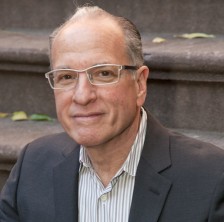
Richard loves being involved in an industry that has a direct impact on improving customer service for us all. As President of The Center For Client Retention, he has a clientele of Fortune 500 companies and small businesses who rely on his firm’s research and consulting to improve the customer experience.
As a consumer, he is always thrilled to find a Welcomer, a frontline associate who innately delivers a memorable experience beyond anyone’s expectation.
We know that the answer is often somewhere in between, but the fun of this section is that you have to pick just one!
Paper > Plastic
Personalization < Privacy
In-Store Shopping < Online Shopping
Transactional > Relational
Mac < PC
Customer Service > Customer Experience
Captain Kirk < Dr. Spock
Talk < Text
Dog < Cat
Movie Theater < In-Home Rental
What was your first job and what did you learn about customer service in it?
My first job was working in my dad’s retail store when I was a teenager. I collected money at the cash register, which always gave me a thrill. But more than entertaining, it was an education. It was as if I was taking a college course in customer service. I could see my dad interact with people as they entered his store. And the key word is people. My father saw all customers as people first, customers second.
His first words were never “what can I do for you today,” but “how was your weekend, or I’m sure your daughter’s wedding was wonderful or hope your son’s first semester in college is going well.” My dad was as interested in the customers and their lives as much as what they were going to purchase at his store.
Tell us how one outside influence impacted your customer service or customer experience thinking. (For Ex. book, movie, sporting event, relationship, travel)
When I worked at ADP during my corporate career, the CEO was Josh Weston. Josh was a numbers guy, and the most important number he ever asked for or quoted, was a region’s customer retention percentage. Josh understood that if we could reduce customer attrition, it would have a dramatic impact on improving profitability.
Customer satisfaction results were key, but what I learned at ADP was that even though customers could be satisfied with your product or service, they still might leave your company to do business with a competitor. It was vital to know why. This had a major impact on my thinking about how re-purchasing is the ultimate measurement.
In your own personal experience, has customer service gotten better or worse in the past five years?
From my perspective, customer service has declined and is continuing to do so. There is constant turnover of staff because of poor management and low wages. Most senior executives don’t understand the value of hiring competent personnel and providing the necessary training and coaching on how to create the exceptional customer experience.
However, I have found Welcomers along the way; frontline associates who see the customer as a person first, customer second, just like my dad did so many years ago.
> I consider it a bad customer experience when I am placed on hold for more than 2 minutes.
> In five years, the most important social media channel for customer service will be something not yet created/invented.
> The best book I read in the last twelve months was Setting The Table by Danny Meyer.
To connect with Richard Shapiro further visit him at www.richardRshapiro.com.
Comments are closed.
© 2011-2025 CTS Service Solutions, LLC.
All rights reserved.
Legal Information | Privacy Policy
How to Cite this Site
Hey, I know Richard Shapiro; just a different one…:).
You mention customer service deteriorating primarily because of turnover and low wages. There is certainly a ‘cost’ associated with this and we teach the same thing in insurance and controlling costs for our customers. Be slower to hire, have a competitive wage, and have the right culture and it’s truly a case of spending $5 to make $20. Some business owners don’t account for the ‘soft’ costs and dollars going out the back door.
It can be a challenge though to find that right person, even for companies willing to pay above average and invest in culture. When it works, it’s beautiful, but I know a lot of small businesses that struggle with slow to hire. Sometimes the desk can only sit empty for so long. Either way, you nailed it: there are huge soft costs to getting the wrong person.
Hey, if it was easy, everyone would do it, right?
Bill, I’m glad that you know another “Richard Shapiro”. Too bad we don’t know each other. Thanks for your comment. I totally agree. It’s very frustrating that most businesses, especially in retail and hospitality don’t see the true value of a well trained and loyal frontline associate. Have a great day. Rich